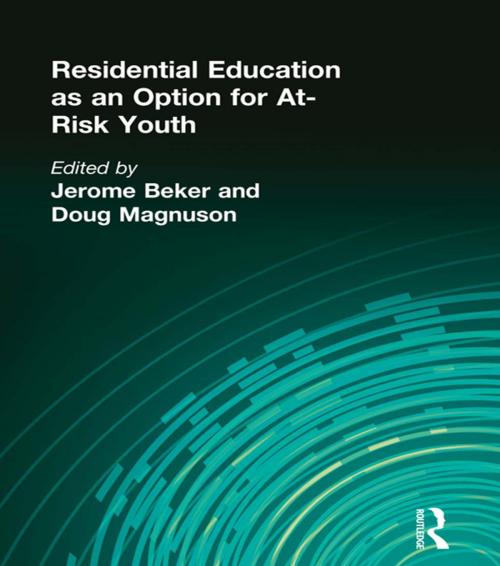Residential Education as an Option for At-Risk Youth
Nonfiction, Social & Cultural Studies, Social Science, Crimes & Criminals, Criminology, Health & Well Being, Psychology, Mental Health, Reference & Language, Education & Teaching| Author: | Jerome Beker, Doug Magnuson | ISBN: | 9781317740117 |
| Publisher: | Taylor and Francis | Publication: | March 18, 2014 |
| Imprint: | Routledge | Language: | English |
| Author: | Jerome Beker, Doug Magnuson |
| ISBN: | 9781317740117 |
| Publisher: | Taylor and Francis |
| Publication: | March 18, 2014 |
| Imprint: | Routledge |
| Language: | English |
Residential Education as an Option for At-Risk Youth explores recent residential programs in Israel, draws comparisons with their European counterparts, and recommends practical approaches for the revitalization of such programs in the United States. This volume refutes the conventional professional “wisdom” in the United States that residential group care programs for children and youth are intrinsically flawed and counterproductive. Instead, it delivers effective models for the implementation of effective residential services. The editors and authors demonstrate the growing need for residential programs, given the overburdened family foster care resources, swelling numbers of “zero-parent” families, and homeless youth.
Though the United States helped launch and develop residential services in Europe in the aftermath of World War II and has produced many excellent thinkers in the domain of quality residential group care, American programs have languished in recent decades. This book is designed to accelerate and facilitate progress in revamping and establishing excellent residential group care. The authors examine residential education as a developmentally based alternative to the more clinically and correctionally oriented programs for marginal children and youth dominating this field in the United States.
The authors present their material in the context of appropriate theoretical principles, yet in practical ways that will permit program developers and managers to implement it effectively. Some of the specific areas chapters discuss are:
-
exemplary Israeli programs as observed by visiting American professional in social work and allied fields
-
important program variables and the cultural influences that may affect them
-
African American experience for such programs
-
a conceptual model for building successful residential education programs
-
key organizational and management considerations
Residential Education as an Option for At-Risk Youth serves as a vital resource for ambitious program developers and managers wishing to reconceptualize and enrich their programs. It will also benefit advanced students, practitioners, and decision makers who have had, heretofore, few resources to rely on when seeking to promote more effective programs for socially marginal children and youth.
Residential Education as an Option for At-Risk Youth explores recent residential programs in Israel, draws comparisons with their European counterparts, and recommends practical approaches for the revitalization of such programs in the United States. This volume refutes the conventional professional “wisdom” in the United States that residential group care programs for children and youth are intrinsically flawed and counterproductive. Instead, it delivers effective models for the implementation of effective residential services. The editors and authors demonstrate the growing need for residential programs, given the overburdened family foster care resources, swelling numbers of “zero-parent” families, and homeless youth.
Though the United States helped launch and develop residential services in Europe in the aftermath of World War II and has produced many excellent thinkers in the domain of quality residential group care, American programs have languished in recent decades. This book is designed to accelerate and facilitate progress in revamping and establishing excellent residential group care. The authors examine residential education as a developmentally based alternative to the more clinically and correctionally oriented programs for marginal children and youth dominating this field in the United States.
The authors present their material in the context of appropriate theoretical principles, yet in practical ways that will permit program developers and managers to implement it effectively. Some of the specific areas chapters discuss are:
-
exemplary Israeli programs as observed by visiting American professional in social work and allied fields
-
important program variables and the cultural influences that may affect them
-
African American experience for such programs
-
a conceptual model for building successful residential education programs
-
key organizational and management considerations
Residential Education as an Option for At-Risk Youth serves as a vital resource for ambitious program developers and managers wishing to reconceptualize and enrich their programs. It will also benefit advanced students, practitioners, and decision makers who have had, heretofore, few resources to rely on when seeking to promote more effective programs for socially marginal children and youth.















